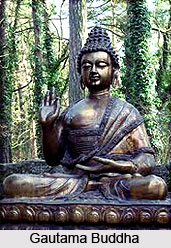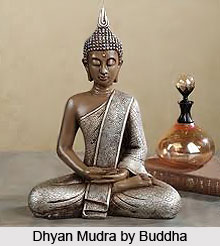 Concept of ethics in Buddhism is conventionally based on what is viewed as the enlightened perspective of Lord Buddha. The ethics of Buddhism is based on its psychology. All sound philosophy and true ethics require correct psychological analysis. The psychology of Buddhism is elaborated in the interests of ethics. The Buddhist discipline, the culture of the will, etc., require some theory of the way in which sensations are produced and attention developed. Buddhist philosophy analyses the moral personality of man and finds the principle of moral causation operating in its growth. Even the repudiation of the Atman theory has an ethical motive. Will, according to Buddhism, is man`s distinctive endowment by virtue of which he is an ethical being. The doctrine of karma or moral causation exhibits all existence as born of desire.
Concept of ethics in Buddhism is conventionally based on what is viewed as the enlightened perspective of Lord Buddha. The ethics of Buddhism is based on its psychology. All sound philosophy and true ethics require correct psychological analysis. The psychology of Buddhism is elaborated in the interests of ethics. The Buddhist discipline, the culture of the will, etc., require some theory of the way in which sensations are produced and attention developed. Buddhist philosophy analyses the moral personality of man and finds the principle of moral causation operating in its growth. Even the repudiation of the Atman theory has an ethical motive. Will, according to Buddhism, is man`s distinctive endowment by virtue of which he is an ethical being. The doctrine of karma or moral causation exhibits all existence as born of desire.
Lord Buddha says that the only thing in the world which possesses an absolute value is the good will, the will freely determined by the moral law. Individuality ceases when, with the wearying of the will, action ceases. Action ceases when delight of the senses in objects ceases. This delight ceases by the recognition of the transiency of life. It is believed that an individual must try to break up the composite self so as to prevent fresh formations. Escape from the chain of rebirth into the bliss of life eternal is the ideal of Buddhism, as of many other Indian and non-Indian systems. The system enunciated by Buddha is free from the extremes of self-indulgence and self-mortification. Buddha found after six years of ascetic life that the true way cannot be attained, by one who has lost his strength.
As per the philosophy in Buddhism, Karma is an act both rational and volitional. It is doubly qualified, being a mental intention issuing in an effect. It is said that psychologically every act has three sides - the volitional preparation, the act itself, and what is called the result of the act, the feeling of regret or remorse which follows the act.
 The first is the intention or the resolve. Though it is not the act itself, it is not meaningless. Again, every choice and every act comprises a real worth and value, momentary in time but permanent in character. Some acts have their reprisal immediately, some after a time, perhaps in the next existence. Further, human acts are distinguished into two kinds - those which are pure, free from asravas, and those which are impure or tainted by them. The pure ones, free from passion, desire and ignorance, do not involve any retribution; do not lead to but destroy fresh individual existence. They prepare the way for nirvana. Good acts are considered those which lead to the conquest of passions, desires, and illusions of the ego. Bad acts are those which lead to unpleasant retributions. Again, good acts are those done with the motive of happiness in the world hereafter and bad acts are those done with the idea of gaining happiness here below. The former destroy desire and lead to a cancelling of the rewards of other acts. Their eventual fruit seems to be nirvana or deliverance. Again, good acts are those which aim at the welfare of others, bad acts those which aim at self-advantage.
The first is the intention or the resolve. Though it is not the act itself, it is not meaningless. Again, every choice and every act comprises a real worth and value, momentary in time but permanent in character. Some acts have their reprisal immediately, some after a time, perhaps in the next existence. Further, human acts are distinguished into two kinds - those which are pure, free from asravas, and those which are impure or tainted by them. The pure ones, free from passion, desire and ignorance, do not involve any retribution; do not lead to but destroy fresh individual existence. They prepare the way for nirvana. Good acts are considered those which lead to the conquest of passions, desires, and illusions of the ego. Bad acts are those which lead to unpleasant retributions. Again, good acts are those done with the motive of happiness in the world hereafter and bad acts are those done with the idea of gaining happiness here below. The former destroy desire and lead to a cancelling of the rewards of other acts. Their eventual fruit seems to be nirvana or deliverance. Again, good acts are those which aim at the welfare of others, bad acts those which aim at self-advantage.
In Buddhist psychology will and intelligence go together. Right aspiration is a product of right vision. It is stated that it is the longing for renunciation; the hope to live in love with all; the aspiration of true humanity. Right action is unselfish action. Lord Buddha does not believe in ceremonialism, prayer and ritual, spell and sacrifice. Buddhism insists on purity of motive and humility in life. Right action leads to right living, free from lying and deceit, fraud and chicanery. The aim of all endeavours is to remove the causes of sorrow. Subjective purification is needed for it. The last three of right effort, right thought and right tranquillity refer to it. Right effort consists in practising control of passions so as to prevent the rise of bad qualities. An inhibition of the bad and a reinforcement of the good by mental avoidance and concentration is what this means. Right effort cannot be isolated from right thinking. Buddhist philosophy says that in order to avoid mental unsteadiness, the mind that plays and roves is to be controlled. It is further said that even spiritual pride endangers moral progress. The five skandhas are said to constitute an exhaustive account of the nature of the human being. However, mental culture is not so much a suppression of the senses as a cultivation of them to see the truth. A true sense-culture means a training of the senses so as to discriminate all forms of sense-consciousness and estimate their real worth.
 In Buddhism, Dhyana is highest contemplation and takes the place of prayer. There is no reference to grace in Buddhism. Concept of ethics also includes the question of self-development. Both the Buddhist dhyana and the yoga doctrine emphasise the physical and hygienic conditions necessary for mental training. Control of the body is a preparation for enlightenment. In the Upanishads it is union with or realisation of Brahman. The Buddhist morality is more individual than social. Conduct is broadly distinguished into well-being and ill being. The former springs out of unselfishness and results in acts of love and compassion, the latter is rooted in egoism and results in acts of malice, etc. It also describes that sensuality, desire for rebirth, ignorance, metaphysical speculation, are four kinds of sinful conduct. According to Buddhist theory, control of anger leads to the growth of gentleness, control of covetousness leads to the spread of charity and control of lust to purity in love. The conditions of virtue are independent of outer things. Buddhism insists not so much on the performance of duty as on the transformation of the whole being. Concept of ethics clarifies that without humility, charity and love, life is death at the core.
In Buddhism, Dhyana is highest contemplation and takes the place of prayer. There is no reference to grace in Buddhism. Concept of ethics also includes the question of self-development. Both the Buddhist dhyana and the yoga doctrine emphasise the physical and hygienic conditions necessary for mental training. Control of the body is a preparation for enlightenment. In the Upanishads it is union with or realisation of Brahman. The Buddhist morality is more individual than social. Conduct is broadly distinguished into well-being and ill being. The former springs out of unselfishness and results in acts of love and compassion, the latter is rooted in egoism and results in acts of malice, etc. It also describes that sensuality, desire for rebirth, ignorance, metaphysical speculation, are four kinds of sinful conduct. According to Buddhist theory, control of anger leads to the growth of gentleness, control of covetousness leads to the spread of charity and control of lust to purity in love. The conditions of virtue are independent of outer things. Buddhism insists not so much on the performance of duty as on the transformation of the whole being. Concept of ethics clarifies that without humility, charity and love, life is death at the core.



















